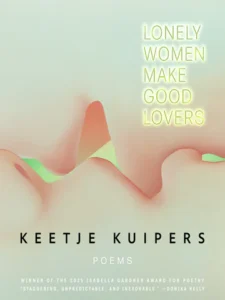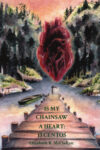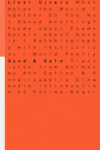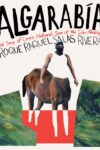
[BOA Editions; 2025]
Keetje Kuipers opens Lonely Women Make Good Lovers, her fourth collection of poems, with an epigraph from Seamus Heaney’s “The Aerodrome.” Her choice is particularly apt: like Heaney, Kuipers observes everyday details with precision and then renders those observations into memorable language. My experience reading her poems reminds me not just of Heaney. The unblinking ferocity of Kuipers’s images and the tough vulnerability of her tone recalls Kim Addonizio or Sharon Olds. Both of these poets offer the same unflinching honesty presented with stunning imagery that I find in Kuipers’s poems. Addonizio in particular has a sharp edge to her observations that startles readers, and I felt that razor’s edge many times while reading this new book.
Three lines into “With Greta Garbo in Palm Springs” we are treated to an image of the ground that “would stretch before us / a green freckled thigh against a dark sheet.” I have scarcely recovered from the beauty of that image before the poet turns her gaze upon her wife and daughter asleep, “their blond hair spread against / the pillow like a silk scarf in a silent movie.”
This is the collection of a mature and confident poet who couples delicate imagery and complex ideas with a metaphysical precision. In “Spa Days,” she begins
I drive through the yellow ribcage of maples
arching the road, past the butch woman I want
to be, raking leaves in her front yard, hair
slicked back at the sides.
The “yellow ribcage” presents trees grown skeletal as they lose their leaves, an image reinforced two lines later with the “butch woman” busy in her yard raking leaves. She does not want to be only an observer driving through the falling leaves but an active participant cleaning up. The tone is elegiac, a wistful sense of who she might be pictured against the autumnal backdrop of the falling year.
Kuipers complicates that longing with a much more visceral memory as her thoughts arch like the trees over the road. She shows herself searching the internet for winter tights, an activity so banal that it is shocking juxtaposed with that gorgeous ribcage imagery. She stumbles across
…crotchless ones,
a model’s diffident fingertips barely obscuring
the hairless glow of her pussy
The blunt evocation of the model’s pussy jumps out at the reader in a dramatic contrast to the pastoral feel of the maples over the road: it is as if Robert Frost’s diverging roads went somewhere else entirely. The word, too, hits hard. It sounds light and playful, almost childish, but since the once and current U.S. president’s notoriously belligerent use a decade ago, “pussy” has taken on malevolent undertones. I can’t help but feel that Kuipers is emphatically reclaiming the word for her own use.
For Kuipers, the body is the departure point for exploration, flashing images or memories of her body or other bodies. “Sehnsucht,” a tightly observed poem of eight sharp couplets, begins with the poet taking her clothes off before moving to other, more figurative images that only suggest exposure. She shows us a skirt washed up on shore and birds on the sand after tossing off her clothes, reversing an expected order, eschewing a slow seductive strip tease in favor of shocking vulnerability. Her use of couplets and enjambment across the stanzas both adds to the tension and startles with unexpected humor. The first three lines run like this:
Taking all my clothes off,
as my therapist reminds me,
is my specialty.
The rapid flow from taking her clothes off to her therapist to the funny, tossed-off line about her specialty knocks readers off balance. Is this seductive? The therapist line suggests otherwise. Is this deadly serious? The “specialty” line undermines that reading. We are asked to approach the lines cautiously and gently, so when Kuipers says
…Getting naked fast
is what I do to collapse the distance
between myself and any
body that seems to want
to resist me
we read this not as teasing or seductive but as a confession of longing and emotional sensitivity. The brilliant line break between “any” and “body” emphasizes the ambiguity of the word, as it highlights both the possibility of a random other person and the corporeality of another body. Whether this longing Kuipers feels (sehnsucht is the German term for an intense longing or desire for something unattainable) is sexual or otherwise is not only ambiguous but also unimportant.
Her own naked body shows up again in “I, too, took pictures of my body.” The title bleeds into the first line so it continues “naked. Or let my best friend take them/for me.” For the young speaker of the poem, the naked pictures are both liberating and frightening. She remembers the man at the shop where her film was developed asking her if she were a model, but the assured pose she takes confuses herself as well as the man. She wonders if her “body existing in the world” is something she already grasps or if the pictures “were the thing / I was using…to find out.” The body might be a way to navigate the world, but the path is never clear, and Kuipers reminds her readers with every line.
Inhabiting a body is endlessly dangerous. “Greek Chorus,” a love letter to her body, comes at the readers in short, staccato bursts of lines sometimes shocking in their ferocity. The speaker explains that her doctor tells her that loving herself is now her job, so she begins masturbating with “the seriousness/of earned salt/and an imaginary/salary.” Her thoughts fly to lovers who have fucked her before and then back to her own body, ending with the startled revelation about “how easy/it is—good/girl—to love/me still.” Her orgasmic epiphany feels overdue, and we sense the great relief of a pleasure that combines sexual and emotional fulfillment.
Other bodies also fascinate the poet. She watches a young girl posing for photos and clutching her belly in “Pregnant Girl Creek,” and soon the girl becomes another girl the speaker had once known. The two girls—the remembered and the present—grow into a metaphor about vulnerability and the precarity of love. The speaker imagines “careless people” speaking blithely about how “it doesn’t cost/anything to be kind” when she knows that “cracking yourself open to the world long enough/to feel love for a stranger” is very expensive. Speaking from a distance acquired by age and experience, the speaker sees the great pain emotional vulnerability can cause; it is, after all, paid for by “cracking yourself open.”
The physical reality of the pregnant body fascinates the poet, and Kuipers returns to the image. “In the Outdoor Shower with My Pregnant Wife” turns to Kuipers’s fears about how her wife’s body “is about to be ruined forever/in the breaking open.” Here again we see the body cracking and fracturing as change looms ahead. In the same way that she seems to find the cracking pain of vulnerability to be worthwhile, she looks forward to the changes in her wife’s body as much as she dreads them. “I want already/the body scarred by stretch marks” she says, and she longs to “worship the body after the storm.” Her impulse to charge straight at the things that frighten or threaten her is exhilarating.
This charging impulse shows up in so many of the poems in this collection, and in the final poem, “Now that we’ve been married all these years,” she paints it as a compulsion to love. Kuipers begins the poem with a list of unrelated images culminating in a “tendril of melted ice cream/snail-stickying your wrist’s golden/expanse.” The image is impossibly gorgeous, and the newly coined verb “snail-stickying” is a poem all on its own. Most readers will have seen a snail’s silvery, sticky trail, and most have had ice cream melting down their arms, but to combine the two images is metaphysical genius. Just as I cannot do anything but love that image, she cannot do anything but love her wife.
However, Kuipers does something different with this compulsion to love. Whereas countless love poems compare love to something inward-turning, Kuipers sees it instead as a type of liberation of herself. She says:
…When some people get married,
they’re making a pact with another person.
When I married you, I made a pact with the world.
I live in it now, and refuse myself nothing.
The love she describes here is an acceptance of things, and this gives her confidence to refuse herself nothing.
So many of the poems in this collection bring us to the brink of danger. The images lure us in or shred our hearts, but Kuipers stands assuredly and guides us through. In “The Rats,” Kuipers tells about taking care of her daughter’s classroom pets; the rats are “devoted/and they bite.” This odd juxtaposition seems to be a very fitting metaphor for the experience of reading these poems that bite with devotion.
Rick Magee is a professor of English at Sacred Heart University, where he teaches literature and poetry writing classes. His monograph, The Haunted Muse, was published in 2016 by Cambridge Scholars Press, and first book of poetry, Green Latutides, came out in 2023 from Kith Books; he is currently working on a new book of poetry. His poems have appeared in several journals in the US and Ireland. He lives with his wife and son in Bethel, CT, where he is the town poet laureate.
This post may contain affiliate links.






